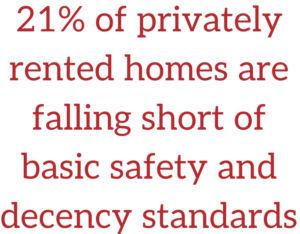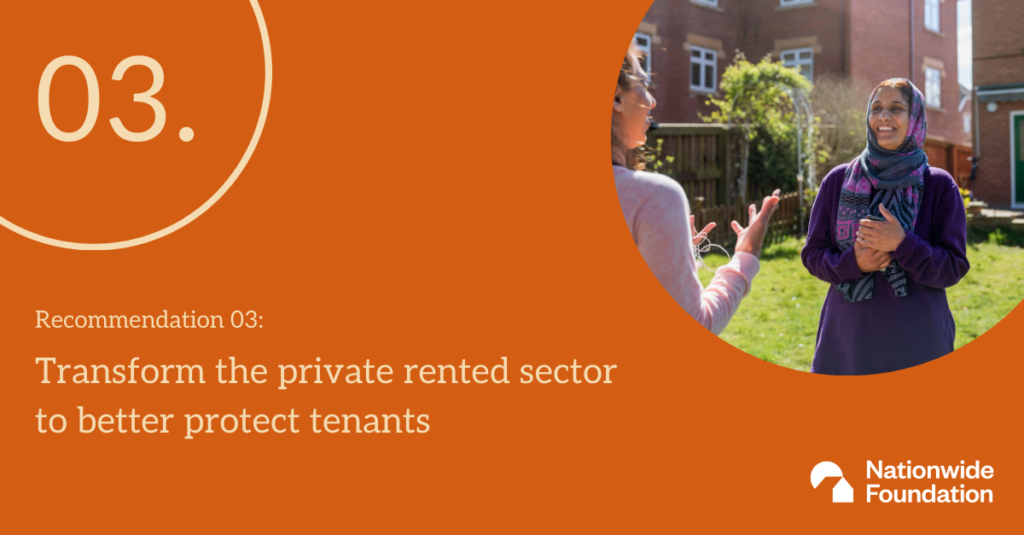We recently published our five proposals for a fairer housing system – five proposals that we believe have the collective potential to transform our housing system.
Since this was published in July, the new Labour government has made a series of announcements around the housing sector, including plans to introduce a Renters’ Rights Bill that will end no-fault evictions. This bill is intended to replace the previous Renters (Reform) Bill which was stalled indefinitely earlier this year after making slow progress through parliament.
If done right, the new Renters’ Rights Bill has the potential to deliver vital reform. But we know that this and so much more is needed to truly transform the private rented sector, so that it delivers the homes renters need. This blog outlines how we think this could be achieved.
Why must the government transform the private rented sector?
All homes, including those occupied by renters, should be safe and high-quality places to build a happy and healthy life for as long as they’re needed. But the experiences of private renters in the UK today are too often characterised by a lack of choice, high rents, insecurity and poor living conditions. Those who are most in need of increased rights and protections are renters who are vulnerable to harm and who often live in unsafe and insecure homes.
There are now 4.6 million households (or 19% of all housing) in the private  rented sector. In comparison, the number of social homes has fallen to 4.1 million from a high of 5.5 million in the late 1970s. This forces vulnerable renters, including families, older people and those with disabilities and long-term health conditions, into often expensive and unsuitable private rented accommodation.
rented sector. In comparison, the number of social homes has fallen to 4.1 million from a high of 5.5 million in the late 1970s. This forces vulnerable renters, including families, older people and those with disabilities and long-term health conditions, into often expensive and unsuitable private rented accommodation.
One fifth of privately rented homes do not meet the decent homes standard, and currently, unscrupulous landlords are able to evict tenants who ask for repairs or who challenge poor practice with a ‘no–fault’ eviction notice. A survey by Shelter in 2022 indicated that nearly 230,000 renters had received a Section 21 ’no-fault’ eviction notice in the previous three years – the equivalent of one notice issued every 7 minutes. This means tens of thousands of households are being forced out of the security and safety of their homes to face a potentially stressful and uncertain future every year.
How could the government transform private renting?
To transform private renting, the government must:
Deliver fundamental reform to the sector as soon as possible that provides real change for renters
The private rented sector must be reformed so that it delivers better security of tenure and improved standards for private renters in England. The new government must pass long-awaited legislation to deliver rental reform. To make this legislation work for renters, it must:
- Abolish no-fault evictions in full, including those that take place through unaffordable in-tenancy rent increases, and deliver longer notice periods when evictions are taking place.
- Ensure any proposed new mandatory eviction grounds include strict evidential requirements and prohibit landlords from re-letting a property for at least a year after using these grounds.
- Ensure severe penalties for landlords who act unlawfully and abuse the new system.
These priorities are agreed upon by renter organisations across the sector, which are brought together by the Renters Reform Coalition (RRC). The Nationwide Foundation funds and is a key member of the RRC, and recently celebrated four years of funding the organisation, and its remarkable achievements during that time.
Support more and better enforcement in the private rented sector
Government data shows that 21% of privately rented homes are falling short of basic safety and decency standards and putting the physical and mental health of tenants at risk. While there are legislative gaps which cause challenges for renters, the fundamental issue when it comes to poor conditions is a lack of enforcement of existing regulations.
Currently, enforcement in the private rented sector is often inconsistent, ineffective and hard for tenants to access. A 2022 study found that 56% of local councils were unable to confirm how many complaints they received from private renters. Very few local councils make proactive use of their enforcement powers, with most merely responding to complaints and only using formal enforcement action as a last resort.
Local authorities have a duty to enforce housing standards and legislation to regulate local private landlords, but funding cuts from central government mean that under-resourced housing teams are unable to adequately enforce standards in the rapidly growing private rented sector. We are calling on the government to
- Provide ring-fenced funding to local authorities to support them to carry out enforcement.
- Encourage collaboration between local authorities and share best practice.
- Require local authorities to regularly report on their enforcement activity.
- Support local innovations to develop and improve enforcement practice.
Last year, we published a blog diving deeper into why proper enforcement is so essential in the private rented sector.
Support compliance through a well-functioning national landlord register, a review of selective licensing regulation and an investigation of the potential for independent property assessments
The government has the opportunity to support compliance by legislating to:
- Deliver a national landlord register which works for renters, good landlords and supports local authorities to enforce regulations. The national landlord register should ensure key data is provided, including the landlord’s contact and address details, past enforcement action against the landlord, eviction notices, basic safety information and Energy Performance Certificates, and up-to-date information about the current and previous rents charged for the property.
- Review the current approach to selective licensing to give local authorities more powers and guidance to ensure this is done effectively to address local problems. Selective licencing enables local authorities to tackle a range of problems in their area through requiring landlords to obtain a licence for each of their properties.
- Investigate proposals to encourage compliance through independent property assessments. These would require landlords to provide independent proof that a property is in good condition and complies with all regulations, before a property can be let out.
Devolve more powers to local and regional authorities to enable them to better meet the needs of local private renters
To ensure the private rented sector meets the needs of every community, more powers should be devolved to local and regional government so they can work with renters and landlords to address local issues.
While private renters face many common challenges, some issues faced by renters differ from area to area and it’s important their voices are heard and acted upon. With more powers, responsibilities and resources being devolved to different levels of government, opportunities to enable private rented sector powers should be considered too. This could include making it easier for local authorities to implement selective licensing schemes, or innovative enforcement schemes. Where private renters are calling for specific interventions, local authorities should have powers to trial and implement different approaches.
Since our recommendations were published in July, the government has announced plans to transfer more power to local authorities, urging councils not currently subject to a devolution deal to “partner with the government”. The English Devolution Bill was announced in the King’s Speech in July and is a positive sign that Labour views further empowerment of metro mayors and other local leaders as key to the achievement of its growth mission. We will be watching the progress of this bill and the impact it has on local authorities’ ability to support private renters.
What are our other recommendations?
Our five proposals for a fairer housing system:
- Transform the private rented sector to better protect tenants
- Support the growth of community-led housing to diversify the housing market and deliver more homes at prices people can afford, in places where they are needed and wanted.
- Place tackling health inequalities at the heart of housing policy
You can read all the proposals in more detail on our website.

